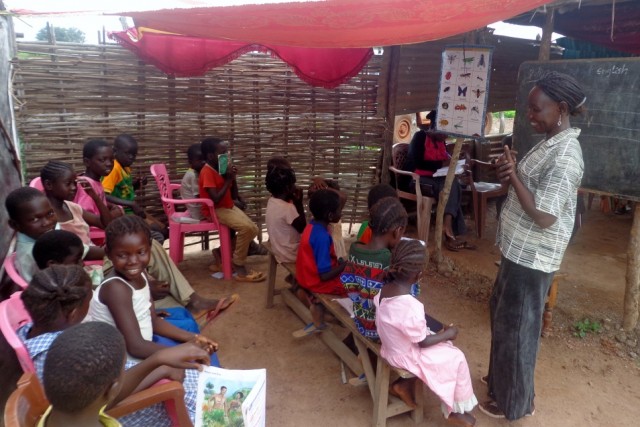From class to community, a teacher learns to heal
By Creative Associates InternationalSeptember 6, 2013

In the blazing days of South Sudan’s hot season, families retreat for naps in their rakubas, outdoor structures used for relaxing in the shade. But Dorina Joseph, the only teacher in the village of Aweil Jedid, has put hers to another use: providing free education to children who cannot afford official school fees.
“Most of the time, students are just at home, sad and isolated from their fellow students who are able to attend the formal school,” says Dorina. “If we do not help now, these kids will end up being street children.”
After a long day teaching at Lokoloko Primary School, Dorina now returns to eager pupils who have camped out at her home waiting for her to teach them, too.
She did not always have such a positive relationship with young students. In the schoolroom, she used to beat them with a cane when they misbehaved. She found them rude when they were easily distracted, fell asleep, or just sat there crying.
It wasn’t until Dorina received training from USAID’s Health, Education and Reconciliation (HEAR) Project that she recognized these students were not rude, but traumatized by violence and war. The training taught her to identify children with psychosocial issues and find ways to deal with them other than corporal punishment.
As her teaching style changed, she noticed students becoming friendlier and seeking her out to discuss the issues affecting them. She began to listen more, and judge less. “I felt like a whole new teacher,” Dorina says.
The training also opened her eyes to the scope of the problem in Aweil Jedid—a village largely populated by destitute returnees from Sudan. Plenty of parents also needed psychosocial support, and were especially stressed over their inability to pay their children’s 70 South Sudanese pound ($25) school fees.
Dorina and her husband, Evaristo Khamis, set out to address both problems at once. They transformed their rakuba into a makeshift classroom, with a few salvaged benches and a blackboard hung on a pole. Then, using the lessons from the HEAR training, the couple started a community psychosocial group to help its members cope with their issues, and improve their economic standing.
With 45 members, the group is now learning to sew, bake and grow vegetables in the hopes of starting small businesses that will generate income.
“We are looking towards the bright future of our children,” says group member Christina Joseph. “When we raise the school fees, they will be better than us in the future.”
State Minister of Education, Dr. Adil Athenesio, said he was previously skeptical of short trainings provided by international organizations, but that HEAR had changed his mind.
“I have been proved wrong with the quality of trainings that the HEAR project carried out,” he said as he gave Dorina a standing ovation at the project’s closing event. “The results have been so tangible within a short time.”
